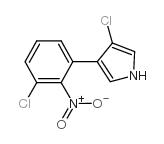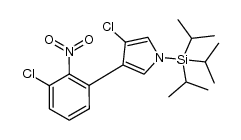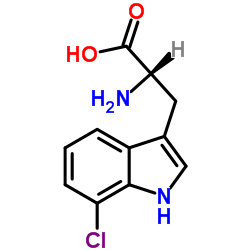1018-71-9
| Name | pyrrolnitrin |
|---|---|
| Synonyms |
Pyrrolnitrine
Pyrrolnitrin Pirrolnitrina Pyroace 3-chloro-4-(3-chloro-2-nitrophenyl)-1H-pyrrole Pyrrolnitrinum |
| Description | Pyrrolnitrin is an antibiotic isolated from Pseudomonas pyrrocinia. Pyrrolnitrin shows a broad spectrum of antibiotic activity against fungi, yeast and gram-positive bacteria[1]. |
|---|---|
| Related Catalog | |
| Target |
Target: fungi, yeast and gram-positive bacteria[1] |
| In Vitro | Pyrrolnitrin (0-100 μg/ml) shows antibiotic activities against various bacteria and fungi with different MIC values. It against Staphylococcus aureus, Mycobacterium, Bacillus subtillis, Candida albicans, Aspergillus niger, and Trichophyton rubrum with MIC values of 50 μg/ml, 100 μg/ml, 0.78 μg/ml, 10 μg/ml, 12.5 μg/ml, and 1 μg/ml, respectively[1]. Pyrrolnitrin (0-100 μg/ml) exhibits antimicrobial effect in a microtitre plate assay. It against Arthrobacter oxydans ATCC 14358, Bacillus coagulans ATCC 7050, Bacillus licheniformis ATCC 14580, Bacillus subtilis ATCC 6051, and Bacillus thuringiensis ATCC 10792 with MIC of 6.25 μg/ml[2]. |
| References |
[3]. R S Gordee, et al.Systemic Antifungal Activity of Pyrrolnitrin.Appl Microbiol. 1969 May;17(5):690-4. |
| Density | 1.523g/cm3 |
|---|---|
| Boiling Point | 410.5ºC at 760mmHg |
| Molecular Formula | C10H6Cl2N2O2 |
| Molecular Weight | 257.07300 |
| Flash Point | 202.1ºC |
| Exact Mass | 255.98100 |
| PSA | 61.61000 |
| LogP | 4.41990 |
| Vapour Pressure | 1.42E-06mmHg at 25°C |
| Index of Refraction | 1.65 |
CHEMICAL IDENTIFICATION
HEALTH HAZARD DATAACUTE TOXICITY DATA
|
| HS Code | 2933990090 |
|---|
|
~71% 
1018-71-9 |
| Literature: Morrison, Matthew D.; Hanthorn, Jason J.; Pratt, Derek A. Organic Letters, 2009 , vol. 11, # 5 p. 1051 - 1054 |
|
~% 
1018-71-9 |
| Literature: Angewandte Chemie, , vol. 106, # 3 p. 346 - 347 |
|
~% 
1018-71-9 |
| Literature: Angewandte Chemie, , vol. 92, # 10 p. 855 - 856 |
| HS Code | 2933990090 |
|---|---|
| Summary | 2933990090. heterocyclic compounds with nitrogen hetero-atom(s) only. VAT:17.0%. Tax rebate rate:13.0%. . MFN tariff:6.5%. General tariff:20.0% |


